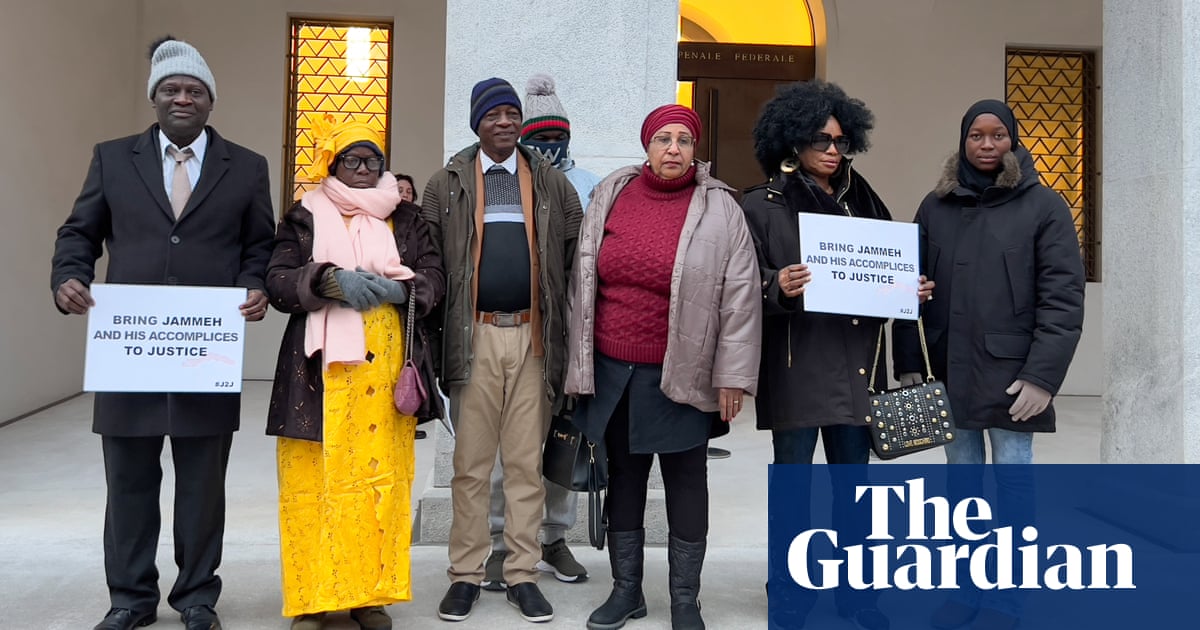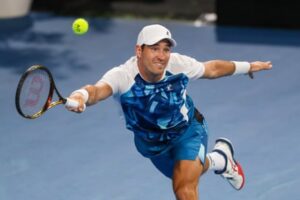
A former minister from Gambia is currently being tried in Switzerland for crimes against humanity, making him the highest-ranking official in Europe to face trial under universal jurisdiction.
In 2017, Ousman Sonko, who was the interior minister during the reign of the deposed leader Yahya Jammeh in a west African nation, was detained in Bern after seeking asylum in Switzerland.
Madi Ceesay, a 67-year-old plaintiff, expressed her feelings to Reuters, stating that she has endured a lengthy period of anticipation filled with frustration and worry. However, she now holds a positive outlook and is overjoyed, believing that justice will be served.
The attorney general’s office in Switzerland has stated that Sonko, aged 54, has been charged with aiding and being involved in the oppressive policies of Jammeh. The office described Jammeh’s 22-year reign as marked by the regular use of torture, rape, unlawful killings, unjust imprisonment, and enforced disappearances.
According to the report, Sonko’s responsibility extends beyond his personal involvement in the alleged crimes, and also includes his position as interior minister, overseeing the police and prison service.
Sonko was accused of involvement in killings, torture, rape, and unlawful detentions from 2000 to 2016. However, he has denied these accusations.
Sonko was taken into custody following a criminal report made by TRIAL International, a Geneva-based non-governmental organization. This report utilized the concept of universal jurisdiction, which enables the prosecution of individuals believed to have committed serious crimes outside of the jurisdiction where the crimes occurred.
In November, a court in Germany applied the concept of universal jurisdiction to find Bai Lowe, a man from Gambia, guilty of crimes against humanity, murder, and attempted murder for his role in a death squad responsible for the killing of a journalist and government critics in Gambia.
As the trial of Sonko began on Monday in Bellinzona, Switzerland, the plaintiffs arrived together, carrying signs that said: “Hold Jammeh and his accomplices accountable for their actions.”
The trial received widespread attention globally. Philip Grant, the executive director of Trial International, stated that the main focus would be on the trial’s beginning and the significance of the justice system finally commencing for all of the Gambia. According to Grant, Sonko is the most senior former government official to be prosecuted under the concept of universal jurisdiction in Europe.
Some people praised the trial as an important part of the larger efforts to deal with the legacy of Jammeh. In a statement, Sirra Ndow, coordinator of the Jammeh2Justice campaign, said, “The trial of Ousman Sonko is another significant step in seeking justice for victims and their families who suffered from brutal crimes during Jammeh’s reign.” Ndow also stated that the Sonko case should strengthen efforts in the Gambia to prosecute crimes committed during Jammeh’s rule and hold those responsible accountable for their actions.
The lawyer representing the defendant expressed intentions to request the court to dismiss the case due to concerns about the investigations and hearings.
Philippe Currat, in an interview with Reuters, expressed his surprise at the handling of this file from the very beginning. He argued that certain evidence presented in the indictment was obtained through undisclosed hearings in the Gambia and that those being interviewed were not made aware of their rights.
Over the next few weeks, the court will likely receive testimony from various Gambian individuals involved in the case. One of the individuals mentioned in the charge is Binta Jamba, who allegedly accused Sonko of sexually assaulting her on multiple occasions between 2000 and 2002 after he killed her spouse in relation to a supposed coup plot.
The charge also claims that in 2005, he unlawfully confined her for five days, physically assaulting her and sexually assaulting her multiple times.
Bypass the advertisement for the newsletter.
after newsletter promotion
“I have been facing this struggle for almost 25 years alongside my family,” she conveyed in a message to Reuters. “Without proper resolution, I will never find peace in my life.”
Currat claimed to have evidence that Sonko was out of the country for a significant portion of the time in question, which coincided with the allegations of rape.
He will also contend that numerous accusations, such as the accusations of rape, occurred before the modifications to Swiss legislation that permit the court to try grave offenses committed outside of the country, implying that the allegations may not be permissible.
In an interview with AFP, Currat stated that the responsibility lies with the national intelligence agency, not his client. He emphasized that Ousman Sonko has never had any authority or legal control over the agency.
Sonko may receive a life sentence if found guilty.
Fatoumatta Sandeng, the daughter of Solo Sandeng, a Gambian opposition activist killed in custody in 2016, said she was looking forward to seeing Sonko in court. “If we don’t hold people accountable, things like this will keep happening in Gambia, in Africa, all over the world,” she said.
This report was contributed to by Reuters and Agence France-Presse.
Source: theguardian.com


















